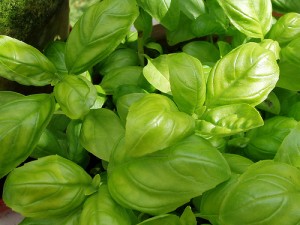 Folk Names: Albahaca, American Dittany, St. Joseph’s Wort, Sweet Basil, Witches Herb
Folk Names: Albahaca, American Dittany, St. Joseph’s Wort, Sweet Basil, Witches Herb
History: Basil is an aromatic annual, native to tropical Asia and Africa and introduced into Europe in ancient times. The herb grows to a height of two to three feet and is now widely cultivated not only for its medicinal properties, but also for its culinary value as a flavoring agent. The high esteem in which this herb is held may be derived from its word origins. Its name may come from the Greek basileus, meaning king, or the Latin basilicus, meaning royal. The Roman, Pliny, described its now-well-known benefits as a digestive that was effective in relieving flatulence and stomach cramps. Its properties had an almost spiritual reputation, as some cultures associated it with misfortune, while others regarded it as a love token or a powerful protector. In ancient Egypt, the plant was used as an embalming herb, and it has been said that Basil was strewn in the tomb of Christ. In the Caribbean and parts of Mexico, Basil was used to return a lover’s roving eye and to attract money. In India, Basil(tulsi) is considered a sacred herb. Its divine essence is actually a disinfectant, and because it is used in almost every Hindu house, it protects the family. In Ayurvedic medicine, Basil is widely used for snakebites and as a general tonic for chills, coughs, skin problems, and earaches. Its chemical components include essential oils (including estragol, eugenol, lineol, linalol), tannins, vitamin C and beta-carotene.
Components: Basil leaves are rich in an essential oil called estragol that is comprised primarily of methylchavicol. The oil is credited for basil’s antispasmodic and germicidal effect. Basil also contains saponins, tannins and flavonoids. Fresh basil also contains carotenoids and folic acid. In its dried form, basil is a good source of calcium, potassium and iron.
Uses: Most people think of basil as a standard culinary herb, complimenting tomatoes and an essential ingredient in pesto, but this is really just scratching the surface. Basil leaves can be combined with a variety of other herbs including garlic, juniper, marjoram, mustard, oregano, paprika, parsley, pepper, rosemary, sage and thyme and can be used in soups, stews, stuffings and rices as well as with fish, chicken, vegetables and meats. They can also be a key ingredient in cheeses, vinegars, oils, jellies, teas, drinks and liqueurs, and seeds can be used in beverages. Purple basils make nice colorful vinegars, and lemon and cinnamon basils can be unexpected but flavorful additions to desserts.
Delicious to eat, Basil is an effective remedy for a variety of digestive and gastric disorders. It has been used to relieve flatulence, ease stomach cramps and nausea and to help stop vomiting. Basil promotes normal bowel function and will relieve constipation, while easing the “griping” pains associated with laxatives. As an antispasmodic, Basil has sometimes been used for whooping cough. It is an expectorant that helps to ease dry coughs and bronchitis, and it relieves catarrh, the inflammation of mucous membranes. Basil has been recommended for the relief of headache. As an aromatic, Basil is considered a fine appetizer, and as a mild stimulant, it has also been used very effectively in cases of complete exhaustion. Its essential oil helps to allay mental fatigue and is said to be helpful as an antidepressant. Basil is an antiseptic. Its antibacterial properties have been used to inhibit organisms that cause dysentery. Topically, Basil was applied to relieve fungal infections and as a poultice to draw the poisons from snakebites and insect stings. The essential oil of Basil may be added to massage oils for sore muscles. Nursing women may benefit from this gentle tonic that helps expel gas in the infant and increases lactation in the mother. Traditional herbalists claim that Basil helps bring on suppressed menses.
Preparation: 2 teaspoons of the herb are flooded with 300 ml. boiling water and boil for 1 minute. Soak for 10 minutes. Drink 3 times daily before meals.
From our catalog you can buy Basil.
 Български
Български
Leave a Reply